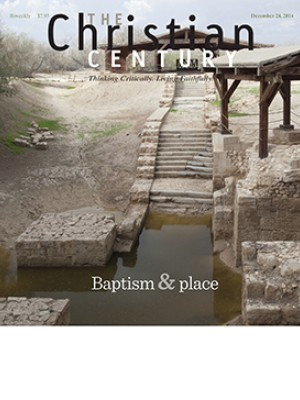Doing Christian Ethics from the Margins, by Miguel A. De La Torre
At such ideologically and politically charged times as these it is almost impossible to discern what a life of Christian faithfulness looks like. Christians who are claimed by the gospel and grounded in Christ fall into promoting diametrically opposing perspectives on issues such as poverty, immigration, the use of force, and ethics at the end of life. Those of us searching for common ground have a good resource in Miguel De La Torre’s Doing Christian Ethics from the Margins. The author’s premise is that the biblical message of a life of faithfulness and salvation through Christ points toward the centrality of the poor and marginalized for a Christian understanding of social transformation and liberation. For De La Torre, “Christian liberative ethics becomes the process by which the mechanisms that dehumanize life, as well as cause death, are dismantled.”
Using the hermeneutical circle of observation, reflection, prayer, and case study, De La Torre invites us to look at Christian living as the task of continuing Jesus’ liberating mission for all people, the oppressed and the oppressor alike. Two specific acts define this activity. First we must choose a location on the margins from which to engage human action in all its spheres (political, economic, cultural, and social; local, national, and global). This will lead us to view the suffering and oppression of people on the margins—as well as the concomitant dehumanization of the dominant culture—as something that is against God and in need of liberation. Second, we must uncover and dismantle the systems of domination and exploitation that contribute greatly to the suffering of groups such as migrants, African Americans, American Indians, and LGBTQ people.
Read our latest issue or browse back issues.
More specifically, De La Torre invites us to uncover the ways in which oppression, racism, immigration laws, and fiscal abuse such as tax evasion and toxic mortgages are implemented to normalize and morally validate the dominant group’s interests and life situations over against those of the marginalized. Because of these systems the lives of the powerful and dominant come to be seen as morally valuable and normative, while the poor are seen as immoral. De La Torre writes:
Whether consciously or unconsciously, Christians of the dominant culture, while truly wishing to remain faithful to their religious convictions, at times construct ethical perspectives to preserve their power, defining their self-serving ethical response as Christian.
According to De La Torre, Christians, whether from dominant or oppressed groups, cannot assume that they are working for peace, justice, equity, and the beloved community if they do not first engage in the hard work of dismantling the very assumptions and systems that sustain a powerful center while oppressing the margins.
Those familiar with the hermeneutical circle of see-judge-act developed in Catholic social thought during the mid-20th century will recognize it in De La Torre’s process of observation, reflection, prayer, case study, and action. “The purpose of the hermeneutical circle is to formulate a praxis—a system of Christian ethics—to change the reality faced by those living on the margins of society.” When grounded in the perspectives of marginalized people, the process of observation and reflection demands deep engagement with their realities, identification of the historical and current forces that result in marginalization, and work alongside the poor in the praxis of liberation, which transforms hearts and relationships between oppressors and the oppressed.
De La Torre applies this hermeneutic to issues ranging from global economic relations and poverty to political funding, women’s rights, and the environment. Each section of the book introduces historical relationships of injustice and power as the context in which Christian ethics must help us decide how to engage the challenges of liberation, justice making, and relationship building. Readers will marvel at the level of detail and depth with which De La Torre approaches each topic, documenting the issue at hand from the perspective of the poor while remaining attentive to those who have traditionally been the winners of the policies and politics of the dominant culture. The first edition of the book, which appeared in 2004, analyzed an expansive list of situations. The 2014 edition updates every section to include the most recent events shaping and challenging the Christian imagination in the United States, such as the 2008 economic crash, anti-immigrant policies implemented since 2004, the current state of the wars in Iraq and Afghanistan, and Supreme Court rulings on affirmative action.
As a Christian and an ethicist, I read this volume wondering whether I have ever paid as much attention to any particular issue as De La Torre does. He uncovers the ways in which policies can mount against the poor, the unceasing lobbying by those in power to retain their power and wealth, and particular stories of lives affected by the military industrial complex and by the longstanding protections afforded to corporations and their executives as the “job creators.” For example, De La Torre’s analysis of national poverty includes deep discussion of the ever-increasing inequality of wealth in the United States, of how race and gender have historically affected access to wealth-creating mechanisms, of corporate welfare before and after 2008, of the struggle to raise the minimum wage and the effects of raising a family on the minimum wage, and of the challenges of access to adequate housing for a growing number of people in the United States.
De La Torre’s ethical analysis hinges on how we understand wholeness and relationship as expressed in the relationships Jesus sought to edify and those he sought to dismantle or highlight as oppressive, such as that between the rich man and Lazarus. In light of these stories, the reader is asked to consider how policies promoted as good for the economy in reality end up tearing away at human relationships by rewarding some and punishing the rest. One of De La Torre’s case studies is based on the 2011 discussion on the national budget and tax revenues, which was partly informed by Warren Buffett’s op-ed stating that he pays a lower tax rate than his secretary. All the while, De La Torre craftily integrates these detailed and deep discussions with the dynamics of oppression and domination that shape and influence ethical reflection done from the perspective of the dominant culture.
Readers will definitely be challenged to think ethically beyond the headlines or commentary by talking heads on news networks, to consider how current events are shaped by historical relationships of power and domination. Even more challenging is De La Torre’s careful deconstruction of how Christians have baptized domination as divine right and favor for groups in power.
De La Torre accents the difference between church mission efforts that deliver charitable aid and public witness for justice that links our own destiny with that of the poor, with whom we unite in solidarity for social transformation. The former answers to a central call of the biblical message: love of neighbor. The latter responds to the call to live by a common and shared humanity, in imitation of the God who became incarnate amid our suffering in order to transform it through bonds of love.
Though this volume is rich in detail, it does not discuss specific issues that are key to Christian ethical analysis, such as the relationship between church and state; the role of the state in caring for, ensuring access to, and protecting the common good; and how the Christian message contributes to an understanding of human rights. De La Torre clearly invites readers who are truly committed to doing Christian ethics from the margins to dismantle any previous notions about such issues and instead to construct our own theories of what the Christian message requires. But I would have paid a little more and read a little longer to see how De La Torre himself would construct these very important concepts in Christian thought. Maybe in a third edition.






